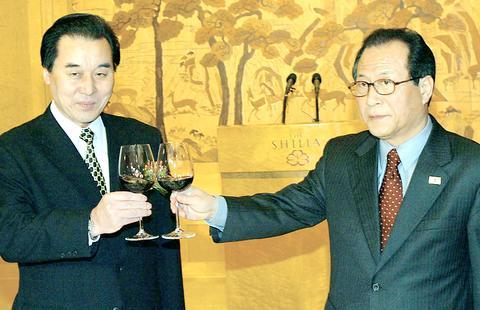North and South Korea pledged yesterday after ministerial talks to work together for the success of multilateral negotiations in late February on ending the beleaguered North's nuclear programs.
The Seoul meeting had been marked by testy exchanges that experts said showed Pyongyang felt increasingly cornered in the world community, especially following revelations this week that a top Pakistani scientist had sold it nuclear technology.
The two Koreas will join the US, China, Russia and Japan in the Chinese capital in a second round of six-party nuclear talks set to begin on Feb. 25.

PHOTO: AP
"South and North agreed to cooperate for a fruitful second round of six-party talks to resolve the nuclear issue peacefully," said a joint statement issued after three days of inter-Korean ministerial talks in Seoul.
The 13th set of Cabinet-level contacts since the capitalist South and communist North began their cautious reconciliation process four years ago began just hours after North Korea announced a long-awaited date for the six-way talks.
But the upbeat mood soon dissipated as the significance of the revelations from Pakistan sank in.
"North Korea is in a difficult situation, in a jam," said Kim Sung-han, a North Korea-US relations expert at the Institute of Foreign Affairs and National Security.
He said the dramatic confessions by Abdul Qadeer Khan, the father of Pakistan's atomic bomb, had undercut Pyongyang's efforts to deny the existence of a clandestine uranium enrichment program that was the catalyst for the nuclear dispute.
"North Korea definitely feels a difference in temperature now," said Kim after South Korea rebuffed the North Korean delegates' efforts to drive a wedge between Seoul and Washington with well-rehearsed calls for "ethnic cooperation."
The North's chief delegate, Kim Ryong-song, sought to blame the US for the relatively slow pace of inter-Korean economic projects and accused Seoul of colluding with Washington.
"To get drawn into the cooperation against the North is to drive the nation to mutual destruction," Kim said on Wednesday.
South Korean Unification Minister Jeong Se-hyun, Kim's counterpart, chided him for creating unnecessary trouble.
"If our relations deteriorate, it will only be damaging to the North," Jeong said.

‘TERRORIST ATTACK’: The convoy of Brigadier General Hamdi Shukri resulted in the ‘martyrdom of five of our armed forces,’ the Presidential Leadership Council said A blast targeting the convoy of a Saudi Arabian-backed armed group killed five in Yemen’s southern city of Aden and injured the commander of the government-allied unit, officials said on Wednesday. “The treacherous terrorist attack targeting the convoy of Brigadier General Hamdi Shukri, commander of the Second Giants Brigade, resulted in the martyrdom of five of our armed forces heroes and the injury of three others,” Yemen’s Saudi Arabia-backed Presidential Leadership Council said in a statement published by Yemeni news agency Saba. A security source told reporters that a car bomb on the side of the road in the Ja’awla area in

‘SHOCK TACTIC’: The dismissal of Yang mirrors past cases such as Jang Song-thaek, Kim’s uncle, who was executed after being accused of plotting to overthrow his nephew North Korean leader Kim Jong-un has fired his vice premier, compared him to a goat and railed against “incompetent” officials, state media reported yesterday, in a rare and very public broadside against apparatchiks at the opening of a critical factory. Vice Premier Yang Sung-ho was sacked “on the spot,” the state-run Korean Central News Agency said, in a speech in which Kim attacked “irresponsible, rude and incompetent leading officials.” “Please, comrade vice premier, resign by yourself when you can do it on your own before it is too late,” Kim reportedly said. “He is ineligible for an important duty. Put simply, it was

PRECARIOUS RELATIONS: Commentators in Saudi Arabia accuse the UAE of growing too bold, backing forces at odds with Saudi interests in various conflicts A Saudi Arabian media campaign targeting the United Arab Emirates (UAE) has deepened the Gulf’s worst row in years, stoking fears of a damaging fall-out in the financial heart of the Middle East. Fiery accusations of rights abuses and betrayal have circulated for weeks in state-run and social media after a brief conflict in Yemen, where Saudi airstrikes quelled an offensive by UAE-backed separatists. The United Arab Emirates is “investing in chaos and supporting secessionists” from Libya to Yemen and the Horn of Africa, Saudi Arabia’s al-Ekhbariya TV charged in a report this week. Such invective has been unheard of

SCAM CLAMPDOWN: About 130 South Korean scam suspects have been sent home since October last year, and 60 more are still waiting for repatriation Dozens of South Koreans allegedly involved in online scams in Cambodia were yesterday returned to South Korea to face investigations in what was the largest group repatriation of Korean criminal suspects from abroad. The 73 South Korean suspects allegedly scammed fellow Koreans out of 48.6 billion won (US$33 million), South Korea said. Upon arrival in South Korea’s Incheon International Airport aboard a chartered plane, the suspects — 65 men and eight women — were sent to police stations. Local TV footage showed the suspects, in handcuffs and wearing masks, being escorted by police officers and boarding buses. They were among about 260 South